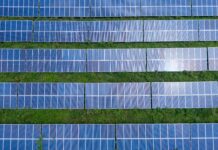Doug Young
Bottom line: The EU’s extension of punitive tariffs to China-made solar panels transshipped through shell factories in Malaysia and Taiwan could kill a recent wave of offshore factory construction by Chinese manufacturers.
A recent offshore movement by Chinese solar panel makers seeking to avoid western anti-dumping tariffs could come to a sudden halt, with word the European Union (EU) is extending its previously announced punitive duties to Taiwan and Malaysia. The EU’s ruling means it believes that many of the offshore solar panel plants recently built by Chinese manufacturers are little more than shells designed to hide the true origin of their products.
This story dates back 3 years, and began when the EU levied anti-dumping tariffs on Chinese-made solar panels after determining manufacturers were receiving unfair government support via policies like cheap land, low-interest loans and export rebates. Chinese manufacturers quickly agreed to raise their prices to levels comparable to those of western rivals in a bid to avoid the tariffs. But then they almost immediately began to violate the spirit of that agreement by offering discounts to buyers in other ways.
The EU is in the process of investigating claims of such violations to that agreement, and this latest development involving panels made in Malaysia and Taiwan shows the EU is also attempting to stop another way the Chinese are avoiding the tariffs. The latest reports say the EU has officially said that all panels made in Malaysia and Taiwan will be subject to the same punitive tariffs as panels made in China. (EU document; English article)
The document goes on to provide a long list of Malaysia- and Taiwan-based companies that will be exempted from the extension of anti-dumping tariffs originally set for China-made panels. But that list includes only truly domestic panel makers in those locations who have been in the business for a while, such as Motech (Taipei: 6244) and E-Ton (Taipei: 3452) of Taiwan and Flextronics (Nasdaq: FLEX) in Malaysia.
Two leading Chinese panel makers that had previously announced plans to manufacture in Malaysia at the height of the offshore movement include ReneSola (NYSE: SOL) and Jinko Solar (NYSE: JKS). Trina Solar (NYSE: TSL) also announced plans last year to develop 500 megawatts of solar panel-making capacity with a local partner in Malaysia, though it never named the partner. (company announcement) In its announcement it said that the partnership would start manufacturing in late 2015 or early 2016.
Shares Near Two-Year Lows
It’s not clear how many, if any, of the Chinese solar panel makers I’ve mentioned will be directly affected by this ruling. Shares of Trina actually rose 3.6 percent during the latest session on Wall Street, though it’s worth noting they’re now trading near 2-year lows. Shares of Jinko Solar and ReneSola posted similar performances.
This latest wrinkle in the China solar exporting story shouldn’t surprise anyone, and certainly doesn’t surprise me. Chinese companies have already shown they are quite capable of using backdoor tactics to avoid their earlier price-raising agreement with the EU. When that backdoor appeared to be closing, they simply tried another one by setting up these offshore shell factories. Such factories simply receive their China-made products, and then claim themselves as the country of origin before re-exporting them to Europe to avoid the anti-dumping tariffs.
The US has taken a similar approach to Europe, levying anti-dumping tariffs against Chinese panels and now taking steps to close loopholes like these shell factories in Malaysia and Taiwan. There’s no indication that the anti-dumping duties will disappear anytime soon, especially as weaker Chinese players like YIngli (NYSE: YGE) show increasing signs of getting more and not less government support.
The bottom line is that the status quo is likely to continue for at least the next few years, even as the US, EU and China start to phase out many of their government incentives for building solar power plants. That means many Chinese-made solar panels could ultimately get squeezed out of the US and Europe as loopholes close that were allowing a continued flow of such products even after original punitive tariffs were levied.
Doug Young has lived and worked in China for 20 years, much of that as a journalist, writing about publicly listed Chinese companies. He currently lives in Shanghai where, in addition to his role as editor of Young’s China Business Blog, he teaches financial journalism at Fudan University, one of China’s top journalism programs.. He writes daily on his blog, Young´s China Business Blog, commenting on the latest developments at Chinese companies listed in the US, China and Hong Kong. He is also author of a new book about the media in China, The Party Line: How The Media Dictates Public Opinion in Modern China.






